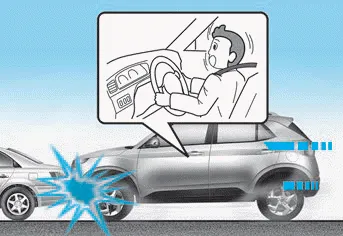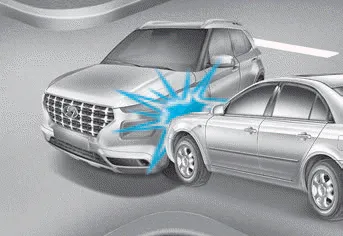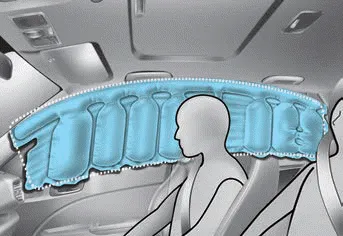Hyundai Venue (QX): Why DidnŌĆÖt My Air Bag Go Off in a Collision? / Air bag inflation conditions

Front air bags
Front air bags are designed to inflate in a frontal collision depending on the severity of impact of the front collision.


Side and curtain air bags
Side and curtain air bags are designed to inflate when an impact is detected by side collision sensors depending on the severity of impact resulting from a side impact collision.
Although the driverŌĆÖs and front passengerŌĆÖs air bags are designed to inflate only in frontal collisions, they also may inflate in other types of collisions if the front impact sensors detect a sufficient impact. Side and curtain air bags are designed to inflate only in side impact collisions or rollover situations, but they may inflate in other collisions if the side impact sensors detect a sufficient impact.
If the vehicle chassis is impacted by bumps or objects on unimproved roads, the air bags may deploy. Drive carefully on unimproved roads or on surfaces not designed for vehicle traffic to prevent unintended air bag deployment.
WARNING To reduce the risk of an air bag deploying unexpectedly and causing serious injury or death: Do not hit or allow any objects to impact the locations where air bags or sensors are installed.
In certain low-speed collisions the air bags may not deploy. The air bags are designed not to deploy in such cases because they may not provide benefits beyond the protection of the seat belts.
Other information:
Hyundai Venue (QX) (2020-2026) Service Manual: Specifications
Specification Air Conditioner item Specification Compressor Type DVE12N Oil type & Capacity PAG 30 120 ┬▒ 10cc (4.23 ┬▒ 0.34oz.) Displacement 122 cc / rev Expansion valve Type
Hyundai Venue (QX) (2020-2026) Service Manual: Climate Control Air Filter. Repair procedures
Replacement 1. Open the glove box. 2. Press both sides of the glove box (A) and take it out. 3. Remove the filter cover (A) by pressing the knob. 4.
Categories
- Manuals Home
- Hyundai Venue Owners Manual
- Hyundai Venue Service Manual
- Tire Pressure Monitoring System (TPMS) (Type A)
- Engine Coolant
- Child-Protector Rear Door Locks
- New on site
- Most important about car
